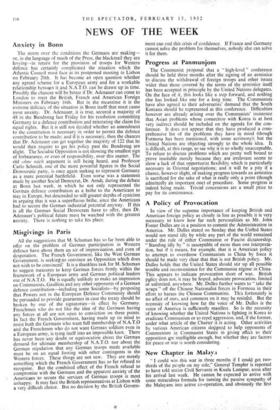Misgivings in Paris
All the suggestions that M. Schuman has so far been able to offer on the problem of German participation in Western defence have about them an air of improvisation, and even of desperation. The French Government, like the West German Government, is seeking\to convince an Opposition which does not wish to be convinced. It is a thankless task for M. Schuman to suggest measures to keep German forces firmly within the framework of a European army and German political leaders out of N.A.T.O. He is equally unlikely to make an impression on Communists, Gaullists and any other opponents of a German defence contribution—including some Socialists—by proposing that Powers not in the European Defence Community should be persuaded to provide guarantees in case the treaty should be broken by one of the signatories—in effect by Germany. Frenchmen who do not like the idea of the Germans having any forces at all are not open to conviction on these points. In fact the French Government, having made up its mind to resist both the Germans who want full membership of N.A.T.O and the Frenchmen who do not want German soldiers even in a European army, is tying itself into an impossible knot. There has never been -any doubt or equivocation about the German demand for ultimate membership of N.A.T.O. nor about the German stipulation that any German troops made available must be on an equal footing with other contingents in the Western forces. These things are not new. They are merely something which the French Government has so far refused to recognise. But the combined effect of the French refusal to compromise with the Germans and the apparent anxiety of the Americans to secure the services of German troops is most unhappy. It may face the British representatives at Lisbon with a very difficult choice. But no decision by the British Govern- ment can end this crisis of confidence. If France and Germany cannot solve the problem for themselves, nobody else can solve it for them.


























 Previous page
Previous page